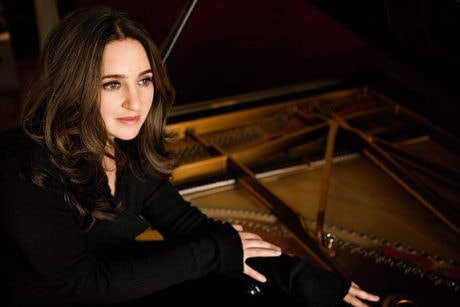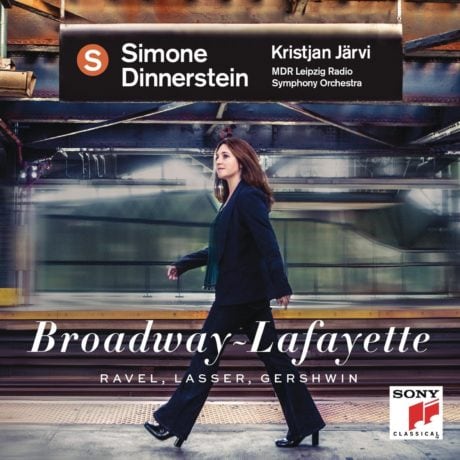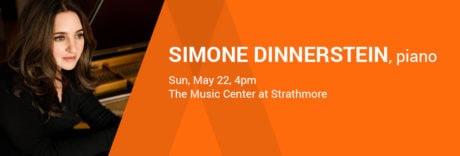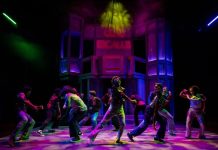American pianist Simone Dinnerstein (pronounced See-MOHN-uh DIN-ner-steen), based in New York, gained an international following the remarkable success of her recording of Bach’s Goldberg Variations, which she raised the funds to record.
Released in 2007 on Telarc, it ranked No. 1 on the U.S. Billboard Classical Chart in its first week of sales and was named to many “Best of 2007” lists including those of The New York Times, The Los Angeles Times, and The New Yorker.

The four solo albums Dinnerstein has released since then – The Berlin Concert (Telarc), Bach: A Strange Beauty (Sony), Something Almost Being Said (Sony), and Bach: Inventions & Sinfonias (Sony) – have also topped the classical charts. Dinnerstein was among the top ten bestselling artists of 2014 on the Billboard Classical Chart.
In February 2015, Sony Classical released Dinnerstein’s newest album Broadway-Lafayette, which “celebrates the time-honored transatlantic link between France and America” and includes Ravel’s Piano Concerto in G Major, Gershwin’s Rhapsody in Blue and Philip Lasser’s The Circle and the Child: Concerto for Piano and Orchestra, written for Dinnerstein.
I spoke to Dinnerstein regarding her upcoming visit to the DC-area and found her to be extremely grounded and an artist with tremendous depth of heart. In addition to her solo recital at Strathmore, Dinnerstein will lead several community-based activities around DC, including a master class for adult amateur pianists and education programs in six D.C.-area schools.
Katie: It was really wonderful to learn more about you in my research for this interview. Could you give us some background on how you first became interested in music?
Simone: I first became interested in the piano when I was 5 years-old and taking ballet classes (while we were living in Italy). There was a pianist who played for the class and that’s where I first heard the instrument and really fell in love with it. I asked my parents if I could have piano lessons which started when we moved home to Brooklyn.
Your father is an artist – did that help you shape your interest in the arts?
Definitely, the arts in my family are extremely important and a life in the arts it is highly respected. They were really supportive of me.
While in D.C., you will conduct a range of community-based educational programs for youth and adults sponsored by Washington Performing Arts, including six visits to DC area public schools.
I love working with school children, especially elementary school students, and I think it’s very important that musicians reach out to students because, unfortunately, in the U.S. we don’t have enough arts education in the public school system. It’s our responsibility as musicians to go into schools and try to connect with students and teach them about why we think that classical music is important, what we love about it, and what’s interesting about it.
You’re very dedicated to your community, founding Neighborhood Classics in 2009, a concert series which raises funds for NY public schools. I see Neighborhood Classics began at PS 321, the Brooklyn public elementary school your son attended. Your mom is also in the education field – is that where you developed your love for education?
Definitely. My mother is a very committed educator and really believes in progressive education for children and child-centered education. It was a very important part of our household while I was growing up and we had lots of discussions about it. My husband is a teacher as well – he teaches fifth grade at PS 321. There is a lot of emphasis on education in my home, but also I relate to young children – and I like that fact that young children are open to hearing anything. I’ve played George Crumb’s music for them, I’ve played Webern – kind of the wilder it is, the more they like it. It’s really nice (to reach them) before lots of prejudices start getting into the way of listening.
One of the videos I saw from your visit to PS 321 was a performance of the Goldberg Variations; you were describing inversions and parallel lines and the children seemed so sharp. They knew the answers to your questions without any prompting. It was fascinating.
They’re very smart – on this trip to D.C., I will talk about Philip Glass’ music and show students how he uses patterns to build musical structures. It’s very interesting how well they can hear those kinds of patterns. I am hoping have them make up their own patterns as well.
You will also lead a master class for adult amateur pianists, the day before your Strathmore recital. How do you like working with adults?
It’s quite special because adult amateur pianists are very serious and very committed. In many ways, adults that are taking the time to practice and seriously study are even more artistic and devoted than the professionals.
What advice do you give to young aspiring musicians who want to seek a career in the arts?
If they feel very passionate about it and absolutely can’t imagine anything but having a life in music, they should pursue it. But if they feel any kind of doubt or question, it’s not the right path to take because it’s a very challenging lifestyle and you have to be open to defining yourself in many different ways if you’re earning a living as a musician. Very few people have a career where they can just play concerts and recitals. If you want to be a professional music, you have to do it because you absolutely love music and you want your life to be about music in whatever shape that might take.
That’s fabulous advice – if there’s one piece of advice that stuck with me as an aspiring musician, it was,“If you can do anything else, do it.” A very good way to help artists draw the line.
I think that some people that I’ve spoken to felt that having to earn a living through music made them lose their love for it. And so they were able to preserve that love by having a different kind of job and keeping the music as a passion that was just for them.
There’s a lot of emphasis recently on the benefits of meditation, and slowing the mind. You have called listening to and playing the Goldberg Variations as meditative. Can you elaborate?
I think when it’s going really well, I’m completely absorbed in what is happening at that present moment and my focus is entirely on the music I’m playing. That’s a really difficult state to achieve. It’s hard to clear your head of all of the other things that you might be thinking about – what’s going to happen, what just happened…it’s very hard to let things go and just be with what you’re hearing. But that’s my ideal state. I can’t say I achieve that every day.
I’m a yogi and what you’re describing is what all yogis strive for, the time when you’re just absorbed in the moment, and I think in turn, that anyone who can pursue the arts, even in their spare time, can really elevate their mood, – it’s therapeutic. How do you maintain balance with your busy lifestyle?
That’s another challenge. I think it’s important to have a “real” life that is separate from your professional life. The problem with being a freelancer is you can think about your work every moment of the day if you let yourself. I don’t think that’s very healthy. But I’m not always able to control myself from doing that. I do have a family – a husband and son, and also a dog who has been tremendously helpful for me. I find that the fact that she needs to go outside and run around, and even just watching her play with other dogs is not only relaxing but it’s a lesson in living in the moment. Dogs are pretty amazing like that – they just want to play, there’s no regret or anticipation. Just what they’re doing right at that moment.
I watched your video from “Something Almost Being Said” – it was so sweet, a beautiful family focused video. I feel that combining visual arts with music can enhance the listening experience. What are your thoughts on combining multi-media with your art – does it help people make a better connection?
I do love that video and I feel it achieved everything I wanted it to achieve. But in general, I’m in two minds about mixing the art forms. It can be extremely interesting and if you mix video and music (or any kind of visual with music), that creates another art form that is neither visual nor music; it’s something else. But I think if you want to reach an audience, the best way to do it is reaching them through the music. I am not sure about using other means to reach out to them. I think that is just creating another art form, not to say it isn’t good, but it’s not the same as just listening. I think the problem is right now that there are very few situations where we are in a position to just sit down and listen to music for 80 minutes without pause. Or even just focus on one thing. Everything is so fragmented and rapid in our society, our attention is divided constantly. I think that people – myself included – find it really hard to focus for that long of a stretch.
That’s an interesting perspective. It leads me to a question of social media. It is wonderful that your fans have access to learn more about you through YouTube or your website. Do you feel that social media has improved your ability to reach people that 10 years ago might not have had that opportunity?
Definitely, I think that everyone uses social media now. It’s part of how we learn about things. I’ve certainly had many people coming to my concerts because they follow me on Facebook and I think that people like to interact with an artist or write something and have the artist respond to it. There’s no turning back now, that’s how it is. You can’t be a cloistered artist. Very few people could do that.
Do you enjoy social media, do you enjoy working with it, or is it a distraction from your artistry?
I think it can be fun – I take videos of myself practicing so I can watch myself and I’ve been posting some on my Facebook page and that has been interesting for me. It’s good to record myself anyway, but I think that I have a bit of an obsessive personality and Facebook can kind of suck me into the vortex and I have to be careful about that – it’s actually really distracting and I need to find more of a balance with that, I’m finding it challenging. I just want to throw away my phone – what can you do?
It was fascinating to watch your posts on Facebook, because viewers can see up close what a virtuoso you are and people love to be awestruck. Posting your practice sessions was a great idea and also gives fans a little background on you when you share stories, such as one video where you played the first Goldberg Variation you learned.
Do you have any fond musical memories, a sweet moment that sticks out from your performances?
One concert I remember very fondly was when I used to perform for The Piatigorsky Foundation. Their mission is to send musicians to perform in places that don’t normally have classical music concerts. They send you on tours of just one region of a state. I remember doing a tour of East Texas. I did 10 recitals in little towns and the whole region was unexpected. I didn’t even expect the landscape to be what it was – it looked like England. I played at a church in a town called “Brushy Creek” that was so small it wasn’t even on GPS.
It was a very moving experience because it was a very pretty little church that was completely packed and I performed on an upright piano that they used in the church. Before I played, the minister said a prayer where he asked the people in the audience to open up their hearts to the music. And then I played the concert and it was really a very moving experience.
I love your selections for the upcoming performance at Strathmore. It has been called a “highly personal program,” uniting selections from Glass’ Metamorphoses with works by your favorite composer, Schubert. How versatile would you call yourself when it comes to programming?
I like to play a whole range of music – my tastes tend to be more Germanic than Russian, but I do play a range including French music, and pieces by living composers. I’ve been involved in commissioning a lot of music as well.
Your latest recording, Broadway-Lafayette, was released in February 2015. What is your next recording project?
I’m going to Havana to record my next CD for Sony – it will include two Mozart Piano concertos that I’ll perform with the Cuban Youth Orchestra. I’m very excited about that.
Wow, how did that come about?
A year ago I performed with the Cuban Youth Orchestra as part of a festival organized by the piano teacher I had growing up who is Cuban – Solomon Mikowsky. I played a Mozart piano concerto with them and I just couldn’t believe how good they were and how joyfully they played. It was just wonderful performing with them, and their conductor. I thought it was timely to record with them given the opening of relations between our two countries.
Any other upcoming projects?
Philip Glass is composing a piano concerto for me, coming in 2017. Just recently, I had the wonderful experience of visiting him and playing this program for him. That was amazing – I went to his house and played for him on the piano he uses for composing. It was really extremely exciting to do that.
American pianist Simone Dinnerstein closes out Washington Performing Arts‘ 2015/16 season with a solo recital featuring works by Franz Schubert and Philip Glass on Sunday, May 22, 2016, at 4 pm at The Music Center at Strathmore – 5301 Tuckerman Lane, in North Bethesda. Purchase tickets here.
Simone will also present a masterclass for the Washington Conservatory of Music in cooperation with Washington Performing Arts. The masterclass will be held on Saturday, May 21, 2016, at 1 pm at the Westmoreland Congregational United Church of Christ – One Westmoreland Circle, in Bethesda, MD 20816. It is free and open to the public. More information can be found online.






